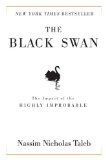 The Black Swan: The Impact of the Highly Improbable
The Black Swan: The Impact of the Highly Improbable
by Nassim Nicholas Taleb
Let me begin by stating right up front that this book isn’t for everyone. Check the following list to see if you should even bother reading on.
- Are you comfortable operating “outside the box”?
- Are you a risk taker?
- Are you willing to extend your comfort zone?
- Are you comfortable with the unknown?
- Can you foresee opportunities?
- Can you imagine the “impossible”?
If you’re not comfortable with the above questions or feel you must honestly answer “no” to any of them, do yourself a favor, save yourself some time and money, and find another book. This one won’t interest you.
If you can honestly answer yes to the above questions, you’ll find this book interesting and useful in advancing your career and successfully dealing with anything life may hold for you in the future.
Now, let’s begin by learning more about a “Black Swan” as defined by the author Nassim Nicholas Taleb:
A Black Swan is a highly improbable event with three principal characteristics:
- It is unpredictable;
- it carries a massive impact;
- and, after the fact, we concoct an explanation that makes it appear less random, and more predictable, than it was.
Why the term “Black Swan”? Relatively simple. People in the Old World were convinced that all swans were white. Pretty hard to argue that point as no one had ever seen a swan of any other color. The sighting of the first black swan was obviously quite a shock to everyone.
However, that is not where the significance of the story lies. It illustrates a severe limitation to our learning from observations or experience and the fragility of our current knowledge. One simple observation can invalidate a general statement derived from a thousand years of confirmed sightings of millions of white swans. All you need is one single black swan. Need examples? No problem.
- The astonishing success of Google, which propelled two young college students into the realm of billionaires, was a Black Swan.
- 9/11 certainly falls into that category. Can you imagine gathering with a few friends on the evening of September 10 to discuss the possible odds of 19 terrorists high-jacking four major U.S. commercial airliners and directing them into the twin towers of the World Trade Center in New York City, the Pentagon in Washington, D.C. and a vacant field in Pennsylvania? Unimaginable!
- How about the rise of Hitler and the subsequent war?
- How about the precipitous demise of the Soviet Bloc?
- How about the rapid growth of the Internet?
- How about the rise of Islamic Fundamentalism?
- How about the market crash of 1987 and the more unexpected recovery?
- How about the fads, epidemics, fashion, ideas, the emergence of art genres and schools?
All follow these Black Swan dynamics. Literally, just about everything of significance around you might qualify. Take just a minute to look closely at your own existence. Count the significant events, the technological changes, and the inventions that have taken place in our environment since you were born and compare them to what was expected before their advent. How many of them came on a schedule?
Now look into your own personal life, to your choice of profession or meeting your mate, your exile from your company of origin, the betrayals you faced, any sudden enrichment or impoverishment. How often did these things occur according to plan?
For the author, black swans underlie almost everything about our world, from the rise of religions to events in our own personal lives. Why do we not acknowledge the phenomenon of black swans until after they occur? Part of the answer, according to the author, is that humans are hardwired to learn specifics when they should be focused on generalities. We concentrate on things we already know and time and time again fail to take into consideration what we don’t know. We are, therefore, unable to truly estimate opportunities, too vulnerable to the impulse to simplify, narrate, and categorize, and not open enough to rewarding those who can imagine the “impossible.”
See the critical importance to our society of creative entrepreneurs, daring dreamers, and those who thrive on thinking out of the box? Let’s go back to 9/11—an event that has impacted millions of people world wide. Had the enormous risk been deemed conceivable prior to that historic date, it never would have happened! Fighter planes would have been in the air above New York City, all commercial airliners would have had locked bulletproof doors as they do today, no one would have been able to board a plane with box cutters, no one could have requested flight lessons less the take off and landing instructions without raising suspicions. In short, the attack would not have take place, period!
Now dare to relate that Black Swan to our business environment. It’s mind boggling when you consider the present state of the economy, trade balance, immigration, the energy crisis, the stock market, health care, education, social security, Afghanistan / Iran / Russia / China, home mortgages, an election year, and the list goes on. Is anyone in any organization considering the possible Black Swans awaiting us and how we should deal with them with they appear? Few, if any!
I can think of a number of corporate Presidents, CEOs, board members, and leaders at every level that should read this book in hopes of creating a “Black Swan” mind-set and encouraging their employees to do the same. Instead they will continue to concentrate on things they already know and time and time again fail to take into consideration what they don’t know, what they might do, what potential new approach might entirely change their operation. They continue to play it safe. They will suffer the consequences later.
And yet, we envy and respect those that have and do contemplate the potential Black Swans of our past, present and future. We call them creative entrepreneurs, daring dreamers, out of the box thinkers, and yes, even nuts. We should certainly be thankful that these characters keep emerging to aid our evolution.
This is an entertaining and enlightening book, and fairly easy to read. It has an important message regarding how the world works; that the world is governed not by the predictable and the average, but by the random, the unknowable, the unpredictable―big events or discoveries or unusual people that have big consequences. Change comes not uniformly but in unpredictable spurts. These are the Black Swans of the title: completely unexpected and rare events or novel ideas or technologies that have a huge impact on the world. Indeed, the author argues that history itself is primarily driven by these Black Swans.
(This book review was originally published in 2008 as one of the Top 10 Books – Edition 17.)
Harry K. Jones is a motivational speaker and consultant for AchieveMax®, Inc., a company of professional speakers who provide custom-designed seminars,
keynote presentations,
and consulting services.
Harry's top requested topics include change management, customer service, creativity, employee retention, goal setting, leadership,
stress management, teamwork,
and time management. For more information on Harry's presentations, please call 800-886-2629 or fill out our contact form.
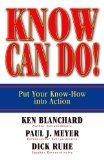 Know Can Do!: Put Your Know-How Into Action
Know Can Do!: Put Your Know-How Into Action
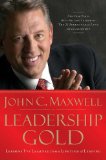 Leadership Gold: Lessons I’ve Learned from a Lifetime of Leading
Leadership Gold: Lessons I’ve Learned from a Lifetime of Leading 2011: Trendspotting for the Next Decade
2011: Trendspotting for the Next Decade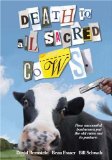 Death to All Sacred Cows: How Successful Business People Put the Old Rules Out to Pasture
Death to All Sacred Cows: How Successful Business People Put the Old Rules Out to Pasture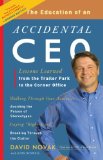 The Education of an Accidental CEO: Lessons Learned from the Trailer Park to the Corner Office
The Education of an Accidental CEO: Lessons Learned from the Trailer Park to the Corner Office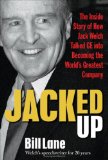 Jacked Up: The Inside Story of How Jack Welch Talked GE into Becoming the World’s Greatest Company
Jacked Up: The Inside Story of How Jack Welch Talked GE into Becoming the World’s Greatest Company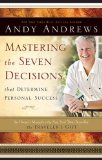 Mastering the Seven Decisions That Determine Personal Success: An Owner’s Manual to The Traveler’s Gift
Mastering the Seven Decisions That Determine Personal Success: An Owner’s Manual to The Traveler’s Gift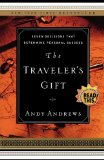 The Traveler’s Gift: Seven Decisions that Determine Personal Success
The Traveler’s Gift: Seven Decisions that Determine Personal Success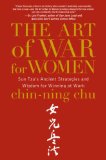 The Art of War for Women: Sun Tzu’s Ancient Strategies and Wisdom for Winning at Work
The Art of War for Women: Sun Tzu’s Ancient Strategies and Wisdom for Winning at Work The Black Swan: The Impact of the Highly Improbable
The Black Swan: The Impact of the Highly Improbable